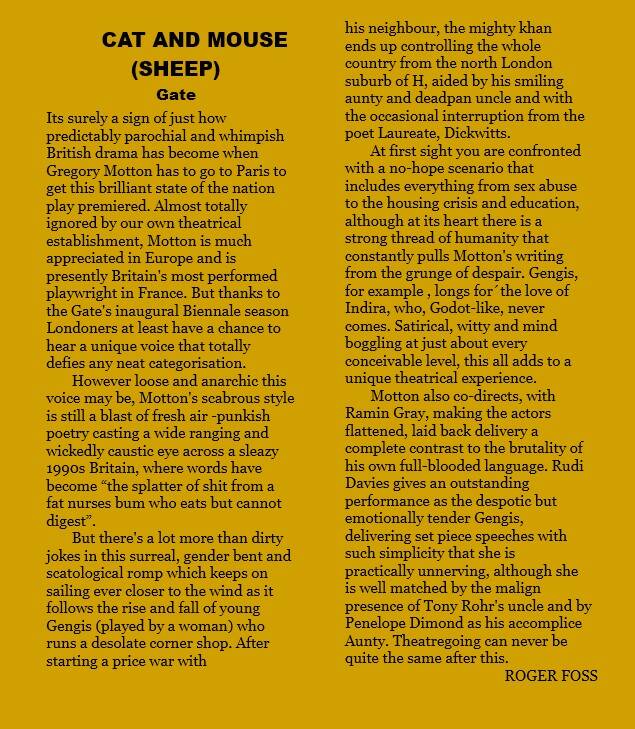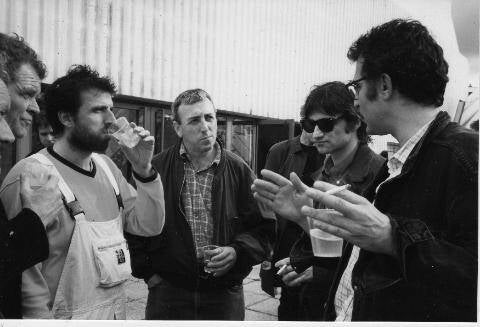Performed in Britain 1995, Gate Theatre, Notting Hill

Cat and Mouse(Sheep) in return from Exile.
"Theatre should never be the same
again after this" (What's On and Where to Go).
"Motton is in characteristically iconoclastic, strident form. You enjoy feelings of shock, curiosity, amazed bursts of hilarity, irritation, sudden clarity, confusion, more amusement. When the furious and adamantine block of political satire rises up, iceberg-like, from the sea of wilfully obscure wordplay, it is brilliant" (The Independent)
"Pinter in reverse, Joe Orton accelerated, T.S.Eliot brought up to date" (The Oldie)
By this time the only way I could get a play on in England was as part of a festival of 'European Satire'- that is, as a foregin writer. David Farr, being an old or ex Motton-enthusiast from his Oxford days, who ran the Gate, Notting Hill, invited us over from France. The French paid! Yes they paid for us to put a play on in England. My play was on alongside Elfreide Jelleneck, as European satire. Bizarre.
Sadly Kevin McMonagle wasn't available so we had to find a new Gengis, which seemed unthinkable. The only possible solution had to be one that was interesting in itself- the actress Rudi Davies. My best friend.
She, rolled her eyes, rolled up her sleeves, put on my long-johns (Swedish militaty underwear) and put on my wife's clogs, (see illustration) and on she went.
She was daunted by taking over from Kevin, but on the other hand she knew me well, she knew where all that stuff came from, being my alter-ego wasn't hard for her. She brought a sinister selfish ingenuous cunning to the part, she was a female version of the character, (although we pretended still that Gengis was male). It resonated for the wrong reasons with the audiences who were familiar with telling themselves Margeret Thatcher was a tryrant, but after a few minutes the subtlety of Rudi's performance threw them off that trail and soon they were seeing themselves on the stage as tyrant once again. In one way she brought it closer to them, and she had an uncanny way of talking the lines on stage as if she wasn't in the play but just chatting- it tricked the audience nicely. She brought her own impertinent and questioning mind to the part; she is the kind of person who takes nothing for granted and whose delivery as an actor is totally pure -shot like an arrow out of her own mind as if it wasn't a line. She can say anything as if she has just thought of it and will forget it again in one second. This was of course perfect for my writing and thinking which is based upon rejecting ready-made thoughts.

The audiences, the first to hear it in their own language, were horrified and delighted. The broken taboos swooshed across the stage, to murmurs of astonishment and shock and giggles of amused surprise. The audience made as much noise as the actors at some points, and it wasn't just laughter. At some level they got it, they knew something was happening but they didn't know what it was. After one performance I saw a rather pleased looking Tom Stoppard leaving the auditorium, I think he had come to see what I was about, and by the satisfied look on his face I guess he had concluded I was no threat to his status. He didn't stop to congratulate me thats for sure. Harold Pinter on the other hand wrote a kind letter to me declaring what a good time he had, and claimed to have read several of my plays.
For me this was one of the best audience responses I had had, in that the operation of the play, as per the title, seemed to be working- you could almost hear the cogs in their minds whirling as they tried to ascertain where the play was coming from politically, and they couldn't. At times they gasped, at times they looked at one another in astonishment "are we really here hearing this stuff?". It was great.
And at last, a review from someone who seemd to get it; Roger Foss at the rather unpretentious listings magazine What's On, who said, amongs other things "Theatre should never be the same
again after this"


Really though, it was not all that different from what a good comedian achieves, although I was doing it in very hostile territory; theatre was pioneering the idea of safe space and had made itself somewhere the truth could not be spoken. I was a pioneer in being cancelled. At this time the fashionable comedians were often toeing the party line. The theatre idea of 'radical' was Sarah Kane who wrote The Guardian doctrine on the walls in blood, a foretaste of the stridency of days to come.
Post script; the play was done faily widely around the world, but usually of course in small theatres- the theatre world is always and everywhere dominated by the most closed-minded doctrinaires of the left, it seems to attract them. In France we did still one more production, shortly after London, in French this time, in Gennevillliers a poorer area of Paris in a theatre run by Bernard Sobel, a Marxist, who seemed to like the sentiment of the play. This was making sense, since now at least it seemed that the play's hostility to what Marxists would call the bougeoise mentality, was at least evident. I had been afraid that at the Odeon when we did it in English, it was taken as a bit of a Pythonesque romp.



The English and the French casts meet. Missing are the two aunties and Dickwitts, Elizabeth Mazev, Penny Dimond.
Jean Paul Rouvray, Thierry Bosc, and their English counterparts.
A further French production by the Convoie Exceptionel company.